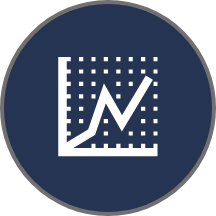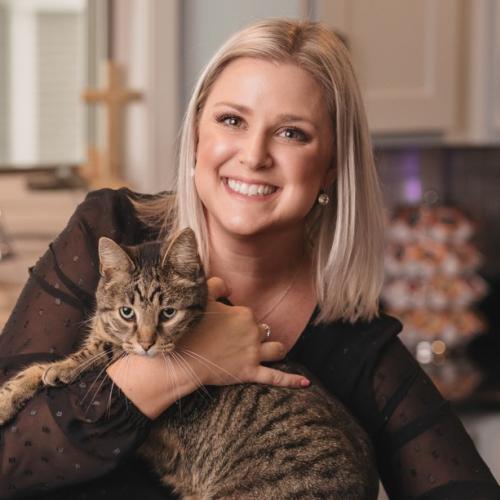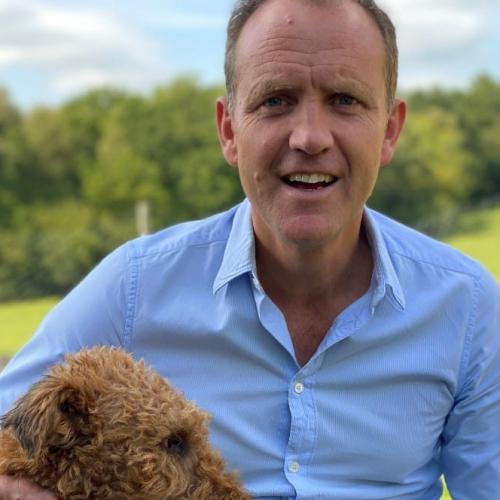Starting with any relevant education, walk me through the twists and turns of your career to date? How did one opportunity lead to the next + what was the key takeaway/ experience in each role + how did this lead you to where you are now)
When I started college, I tried to take both business and science courses for a double major. I took one business class and thought it was so boring compared to my science courses that I never took another business class. Luckily, business is something you can learn on the go, so I’m glad I focused on science and learned the technical skills I needed to start a science-based business. My first career pivot was from pre-med to scientist. I fell in love with DNA during my undergraduate genetics course. I decided I wanted to do genetics research and found a position as an undergraduate lab assistant in the genetics lab at my college. Here I conducted a small population genetics project doing all the steps from lab and analysis to presenting at conferences and publishing. The key take away here was that I knew I enjoyed being a scientist.
I was attracted to expanding my knowledge of the genetic picture further. Epigenetics had the added appeal of being a newer field of study, a place to pioneer new findings
As a master's student, I decided to expand my skill set to look at gene expression… the next level of the genetic puzzle. I found very quickly that although I immensely enjoyed asking questions about gene expression and piecing together a way to collect samples to answer those questions, I really didn’t enjoy the data analysis portion of this work. After my master's, I decide to continue my education and get my Ph.D. because I was not satisfied with the positions I could get at this point in my career. I wanted to do more independent research.
I landed an opportunity to do my Ph.D. in an epigenetics lab. Again, I was attracted to expanding my knowledge of the genetic picture further. Epigenetics had the added appeal of being a newer field of study, a place to pioneer new findings. This is where I developed my passion for epigenetics and realized that I’m an entrepreneur. I was working with sharks and dolphins, and I created an age estimation test for dolphins. I saw how powerful this test was for wild populations, and I knew I wanted to develop tools for real life. In my pursuit of trying to create my own business around this idea, I found that there was a huge opportunity to bring epigenetics to the pet industry and make a big impact in pet health. At the time, I had four dogs that had all become seniors. Three out of four of my dogs blind-sided me with a sudden terrible illness and I wanted a better way to monitor their health. I know epigenetics can help improve pet health care and this was another motivating factor to getting EpiPaws off the ground.
I literally could not sleep at night because I wanted to bring an age estimation test for dogs and cats to market.
What was the pivotal moment that put you on your current founder path?
I loved the age estimation work I was doing as a PhD student, and I wanted to do age tests for all kinds of animals. I’m pretty sure my husband asked if I could do an age test for dogs and the idea started to develop. After I started attending workshops put on by StartUp FIU, the entrepreneur program at my university, I was obsessed and couldn’t stop. I literally could not sleep at night because I wanted to bring an age estimation test for dogs and cats to market.
Can you provide a quick summary of the technology/ area of innovation and its potential application?
Oh, where to begin with epigenetics… a definition might be in order, it’s the study of molecules and mechanisms that interact with the DNA sequence and help determine gene expression changes without changing the DNA sequence itself. It’s really the body’s first line of defense against everything it encounters in its environment, helping it cope with everything from a change in temperature to the thoughts we think. Turns out, it’s also a great way to estimate age and tracking the aging rate of an organism.
The true potential of better understanding epigenetic mechanisms is that we can then alter both the lifespan and health spans of living organisms. Many chronic diseases develop due to the aging process therefore manipulating the aging process can help us avoid disease development in the first place. Additionally, since pets can’t tell us when they are feeling bad, epigenetics could potentially provide us with this kind of health information as it gives us a snapshot of what is happening inside the organism here and now.
Many chronic diseases develop due to the aging process therefore manipulating the aging process can help us avoid disease development in the first place
This makes epigenetic biomarkers useful to several other industries within the pet industry. For example, epigenetic biomarkers could be used to optimize the diet of an individual. Or, it could be used to diagnose a disease (and potentially earlier than we can currently catch diseases.) Or, it could be used to measure the effectiveness and long-term consequences of new pharmaceuticals. As a Ph.D. student, I pitched all the research areas on epigenetic collaborations for whatever it was they were studying.
What stage are you at?
We are early, but we are moving very fast. We incorporated January 2022, and we are now in our first year of revenue. The Pet Age Test was officially launched in the market in January of this year (2023). We are currently doing a seed fundraiser. The use of funds will be for acceleration and growth.
Discuss the biggest challenges of getting to this point? With the benefit of hindsight, what would you have done differently if anything?
It’s hard to say what the biggest challenges were, there were so many challenges, and they were all happening at once which, in and of itself was maybe the biggest challenge. I think there’s not much that can be done about that challenge. After I graduated, I was so obsessed with starting EpiPaws that I immediately started working towards developing the age test. I applied to several jobs during that time, but I think all the interviewers could tell my heart wasn’t there for the positions I was applying to, I was ruined and I hadn’t even finished developing the product yet. This put additional stress on the situation of starting a company. I think I was subconsciously taking the “burn the boats” approach to starting EpiPaws. I was all in and there was nothing stopping this. In hindsight, I would like to say that I should have gotten a job because it did take longer than I thought to launch and raise money, but at the same time, I think I got to where I am now as quickly as I did by having no choice but to do this.
Speaking of speed, as I was jobless and putting my savings into this company, I was rushing towards getting a product on the market to stop the cash hemorrhage. I knew that if I could get something on the market and get people buying that would bring in money from revenue but also from investors. I was putting all my time and energy into preparing the age test but I didn’t realize how big of a task commercializing it would be. From marketing to putting the kits together there’s a lot to figure out. We were fortunate to get to work with Orivet upon launching our product. That really helped us kick off sales. After that, we realized we had some work to do to find our customers and let them know about this new product. It takes a lot of money to market, and you have to figure out how to market so you’ll literally have to spend money without knowing if you’ll get a return on it. The other side of this is the kit that customers would receive. Once the product was launched, we kept having to change things in the kit. We were improving the inserts, then we were trying to save money on the swab/tube setup. Now we have been adjusting the box size and we’re looking at improving how we track kits and make it easier for the customer when registering and making sure we receive their information for the test. There is a lot that goes into the commercial product. My advice to new companies would be to not forget about the commercial product and anything that the customer will need to interact with. This will be an experiment in itself so you will need to start testing and iterating right away on this as much as your technology.
I think I was subconsciously taking the “burn the boats” approach to starting EpiPaws. I was all in and there was nothing stopping this
How have you approached funding?
I’ve approached funding with a “ask for help” philosophy. I found most of my investors by just working on EpiPaws and reaching out for help from individuals who have already done something similar or had expertise in something that I wanted to pick their brain about. It’s been a slow process, and each time I came up empty-handed, it made the desire inside me to see this company through stronger and I always found a way to make it work. Without funding, I was able to put EpiPaws on the map. Imagine what I’ll accomplish if I get my round fully funded.
Have there been any pivot points in the company’s lifetime? What triggered these? Has the value proposition changed
One pivot I had to make was how we focused our efforts and spent our money. Upon starting EpiPaws we were doing research and so money went to getting the necessary samples to develop the age test and these samples were also good for the biological age test we are developing. Once the age test was ready for market, all the focus had to shift towards sales. And all the funds shifted toward sales. So, I had to pivot on the research efforts and just set them to the side for a little bit.
What has been the greatest source of help/ guidance along the way?
Networking with other founders. This is by far one of the most important thing I do as a founder myself and they always give the best advice. Don’t get me wrong, expert advice is equally important, but finding the right expert advice often comes from talking with others who have sought out that advice already and know whom you can trust for help. They also get it and make the journey feel a little less lonely. Another great source of help is the entrepreneur programs I’ve participated in. I did the commercializing research bootcamp at FIU and the M2M program, I did a local city funded accelerator, an incubator at NSU, and I’m currently in an accelerator through FAU at the moment. You’ll see that several of these resources are offered by the local universities near me. They have all been amazing resources and key to my success and the speed of my success… and they're all free.
Best advice you’d pass on to other founders?
Build as though you won’t raise a dime and network with everyone. An MVP that proves you're making what the people want is golden. When it comes to networking, it’s truly a numbers game to find the important people you need to talk to, and you really never know who they may be.
What do you think are broadly the biggest needs and opportunities in the Animal Health and Petcare markets?
I think there is huge opportunity for this proactive space in the Petcare market as many pet owners report being more concerned about their pet’s health than their own.
I think the biggest need is better health monitoring tests (I may be biased). Pet healthcare is reactive, we’re not catching disease or lifestyle problems that lead to disease early enough. It’s only once there is a big problem, that we address the issue. There are a number of startups in the proactive space working towards earlier diagnostics or ways to implement a healthier lifestyle to avoid disease and prolong life. I think there is huge opportunity for this proactive space in the Petcare market as many pet owners report being more concerned about their pet’s health than their own.
What’s going to have the single biggest impact on change in your area of the market?
The epigenetic biomarker market is new and early, and since these markers are applicable and can help improve so many different areas of the market, it’s hard to say what the biggest impact will be. I believe that the first big impact may be on the food market and the ability of epigenetic biomarkers to quickly relay information to us on how a change in the diet is affecting the health of the individual pet. It has the potential to really improve the food formulas that are currently available to our pets.
What do the next two years have in store for you?
I think the next two years have a lot of exciting milestones in store for us. In a year and a half, we were able to accomplish a lot of major milestones: development of a product, launching a product into the market, making revenue, and obtaining investment. Over the next two years, we project a massive amount of growth for the company, including growth in sales for our current product as well as expanding the line of products we offer. We are also working towards getting our products into the vet channel while still offering our products direct to consumers for the DIY pet parent. In two years, EpiPaws will be changing the way pet parents are proactive about their pet’s health.





































